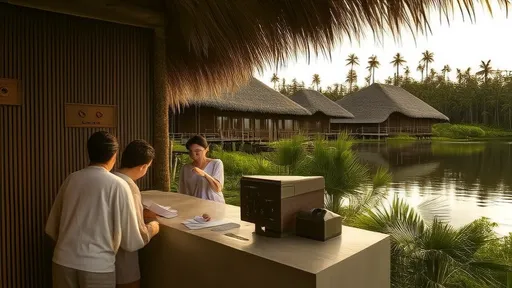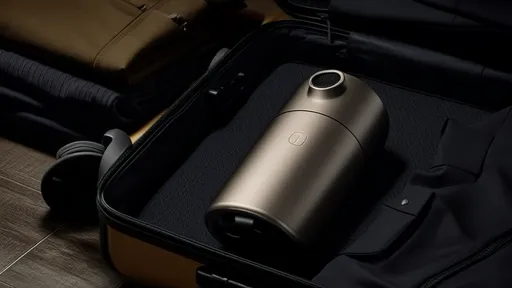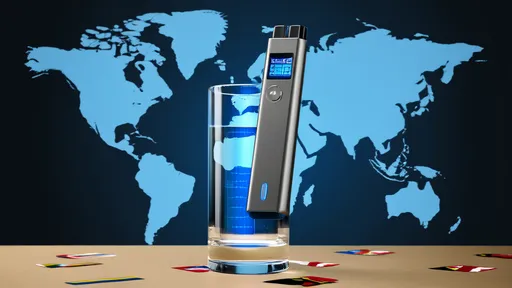In an era where digital overload has become the norm, a new breed of vacation destinations is emerging to cater to those seeking respite from constant connectivity. Digital Detox Island: No-Signal Resort stands as a bold experiment in reclaiming human attention spans and fostering genuine connections. This secluded paradise, accessible only by boat, promises visitors an experience unlike any other – complete disconnection from the digital world.
The journey begins the moment guests surrender their devices at the mainland checkpoint. What follows is a 90-minute boat ride where the gradual disappearance of cell towers serves as psychological preparation for what lies ahead. By the time visitors step onto the island's pristine white sands, they've already begun the process of digital withdrawal that the resort expertly facilitates through carefully curated experiences.
Architecture Designed for Disconnection
The resort's physical layout consciously discourages solitary behavior. Instead of private bungalows, guests stay in shared living pods that encourage interaction. These hexagonal structures feature open common areas with board games, musical instruments, and conversation pits that naturally draw people together. The absence of televisions or wifi routers becomes noticeable only for the first few hours, after which most guests report feeling liberated rather than deprived.
What makes No-Signal Resort remarkable is its thoughtful approach to filling the void left by absent technology. Mornings begin with sunrise meditation sessions on the beach, followed by workshops ranging from pottery to stargazing. The resort employs a team of "connection facilitators" – essentially modern-day camp counselors for adults – who organize group activities that rebuild social skills atrophied by years of digital communication.
The Science Behind the Experience
Neurological research informs many of the resort's offerings. The color palette of guest areas was specifically chosen to reduce eye strain from artificial light exposure. Mealtimes follow strict no-reading policies, encouraging mindful eating and conversation. Even the furniture arrangement in common spaces follows principles of proxemics to create comfortable interpersonal distances that promote organic socialization.
Guests undergo voluntary cognitive assessments upon arrival and departure, with many showing measurable improvements in attention span and stress levels after just 72 hours disconnected. The resort's founder, a former tech executive, collaborated with neuroscientists to create an environment that actively repairs the neural pathways affected by constant digital stimulation.
Challenges of Digital Withdrawal
The first 24 hours prove most difficult for many guests. The resort discreetly monitors for symptoms of digital withdrawal – anxiety, phantom vibration syndrome, compulsive reaching for absent phones. Their solution involves immersive activities like free diving lessons or jungle trekking that demand complete present-moment awareness. By day three, most visitors report sleeping better than they have in years and experiencing heightened sensory perception.
Interestingly, the resort has become particularly popular among Silicon Valley executives and social media influencers – the very people who helped create the always-connected culture. Many arrive skeptical but leave as converts, with some opting to extend their stay beyond the recommended maximum of two weeks. The resort maintains a strict no-photo policy to protect the experience, though guests receive a handwritten journal of their stay upon departure.
Sustainable Disconnection
Beyond being a vacation spot, No-Signal Resort positions itself as an educational experience. Guests participate in daily seminars about maintaining digital boundaries in their regular lives. The resort's post-departure support includes access to digital coaches and a private online community (ironically) for alumni to share strategies for sustaining their newfound balance.
The business model itself challenges conventional hospitality norms. With no advertising beyond word-of-mouth and no online booking system (reservations are made via mailed postcards), the resort has cultivated an air of exclusivity while remaining committed to its anti-digital ethos. This paradox – a destination that can't be Googled – has only heightened its appeal among certain demographics.
As society grapples with the consequences of perpetual connectivity, Digital Detox Island offers more than just a temporary escape. It provides a blueprint for how we might reclaim our attention in an age of endless distraction, proving that sometimes the most advanced solution is knowing when to disconnect completely.

By /Jul 8, 2025

By /Jul 8, 2025

By /Jul 8, 2025

By /Jul 8, 2025

By /Jul 8, 2025

By /Jul 8, 2025

By /Jul 8, 2025

By /Jul 8, 2025

By /Jul 8, 2025

By /Jul 8, 2025

By /Jul 8, 2025

By /Jul 8, 2025

By /Jul 8, 2025

By /Jul 8, 2025

By /Jul 8, 2025

By /Jul 8, 2025

By /Jul 8, 2025

By /Jul 8, 2025